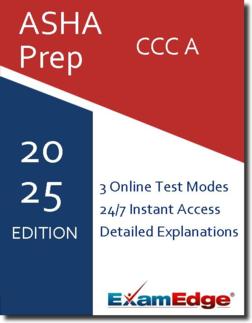ASHA CCC-A (CCC-A) Practice Tests & Test Prep by Exam Edge - Test Reviews
Based on 29 Reviews
- Real Exam Simulation: Timed questions and matching content build comfort for your ASHA CCC-A test day.
- Instant, 24/7 Access: Web-based ASHA Clinical Competence in Audiology practice exams with no software needed.
- Clear Explanations: Step-by-step answers and explanations for your ASHA exam to strengthen understanding.
- Boosted Confidence: Reduces anxiety and improves test-taking skills to ace your ASHA Clinical Competence in Audiology (CCC-A).

ASHA CCC-A (CCC-A) Practice Tests & Test Prep by Exam Edge - Review
ASHA Clinical Competence in Audiology - Reviews
Excellent
Based on
145
reviews
See why our users from 154 countries love us for their exam prep! Including 29 reviews for the ASHA CCC-A exam.
Exam Edge is an Industry Leader in Online Test Prep. We work with our Institutional Partners to offer a wide array of practice tests that will help you prepare for your big exam. No Matter how niche field of interest might be, were here to help you prepare for your test day.
| 2.8M | 4.5M | |
| Users | Tests Taken | |
| 100K | 19 | |
| Unique Exams | Years in Business | |


